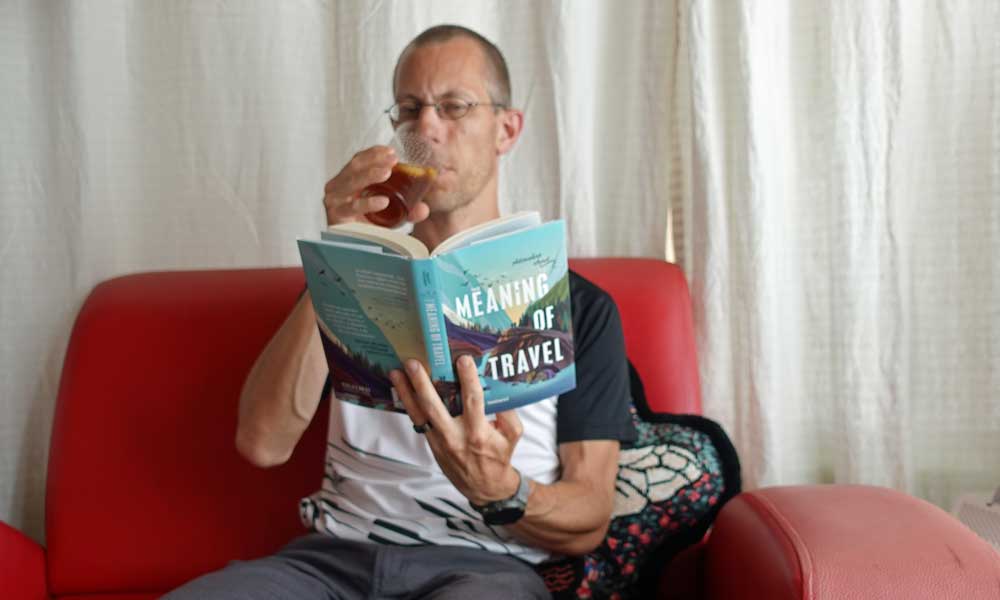Adventures are great, the idea of microadventures even better – but in this social media age of extremes, seeking out relentless excitement, we need something deeper.
My suggestion is that microexploration – an approach to life that acknowledges that most of life is ordinary, but holds endless opportunities for discovery within the ordinary – is such a deeper, more intrinsically beneficial, approach.
Don’t get me wrong.
The Idea of Microadventures
When I say that it’s not all about adventure, be that big or micro, it’s not because microadventures are a bad idea. In fact, microadventures are a great idea you should certainly know about.
The idea of microadventures, popularized by Alastair Humphreys, is that adventures don’t have to be expensive, far-away things.
You can go outside your comfort zone nearby, go on “an adventure that is short, simple, local, cheap – yet still fun, exciting, challenging, refreshing and rewarding,” as the English adventurer, author and motivational speaker Humphreys put it.
If you want – nay, need – more excitement in your life, microadventures might be just the thing for you. Especially if they get you outside into nature, into the outdoors around your home that you would not consider places of adventure because they are all so familiar.
As always, whether something is an adventure (or an exploration) for you depends on the way you see it.

Possible Adventures
When you approach your next walk around the block as an adventure, maybe it can be that for you.
When you do something you don’t usually do, and if that is only to sleep outside in your own yard, it is likely to be something of an adventure for you – and you can find lots of ideas for such things among the microadventures that people have suggested and done.
I just think that we should also consider something else, the learning and looking of microexploration.
The difference lies in the approach and the outlook.
Why Exploration Matters
The very definition of adventure (according to Oxford Languages) is “an unusual and exciting or daring experience.”
We definitely need more unusual and exciting things if and when we get stuck in routines and the familiarity of our surroundings, but we live in a time and situation where everything increasingly needs to be extra-exciting, outstandingly Instagram-readily pretty, extraordinary.
In this regard, all your personal (especially micro-)adventures will just fade in comparison to all the great adventures you see (seemingly) everyone else having.
If you find the right supporters or simply don’t talk about these undertakings of yours, don’t get them compared by others, to others, or manage to not compare them yourself, they will be your worthy (micro)adventures and it will be good.
My fear, however, is that we throw ourselves into these games of comparison right from the start when we set out to have an adventure.
Exploration, if we think of the great explorers and white spots on the map, is a similarly dangerous approach, but that’s not all that exploration is about.
What Is Exploration, Anyways?
Exploration is “the action of exploring an unfamiliar area” or “thorough examination of a subject,” and in this dual meaning lies the great potential.
The only extrinsic (outside) motivation of exploration is that it is about something unfamiliar, but it does not have to be an unusual, exciting (in any social media-worthy way), or daring experience.
Exploration is much more about you and your interests, about fascination that is being piqued by unfamiliarity, by the sense that there is something you don’t know and could learn more about.
This alone makes exploration more of an intrinsically motivated pursuit. It becomes all the more so because it is also the “thorough examination of a subject.”
You could do that, at its easiest, by sitting down and reading books (or perhaps even just starting with YouTube videos or Netflix documentaries on a subject).
Microexploration, Then
Same as microadventures, microexploration can be local and cheap. You don’t have to go far for it. In fact, you could just sit down on your couch.
But you can explore a lot more than you can have adventures with.
Backyard Exploration
Your yard, if it isn’t just a stupidly manicured lawn, probably contains more biodiversity (different species) than you know, and you could explore that:
By looking closer at the diversity of species in it, you’d learn what species there are, how to identify them, what role they play.
In learning more about the diversity of species, you’d also learn to see more of that diversity. You’d come to realize that your all-too-familiar yard is actually not that familiar at all, but holds potential for exploration.

Not into biodiversity? Having a yard that *is* a perfectly manicured lawn?
Look into the history of lawns. You might come away with an understanding of why I called it “stupidly manicured,” and you should definitely find interesting points about the history of landscaping and its relationship to class and aspiration.
Not into anything like that?
Wearables
Look into wearables and what they can tell you about your own body and your place in the world, what they can (help you) do for your health and fitness (like I do here in the “Connecting Tech” category of blog posts and, with more of a focus on the technology, over at Time and Tours).

Microexploration cannot only help with the use of wearables, with health and fitness, with your relationship(s).
… or Other.
Microexploration may make you more aware of your home, your immediate surroundings, and more appreciative of what you see when you travel.
The reward is not (necessarily) excitement and daring, but an ordinary life – of discovery.
And with discovery comes learning, and a better life.


Leave a Reply